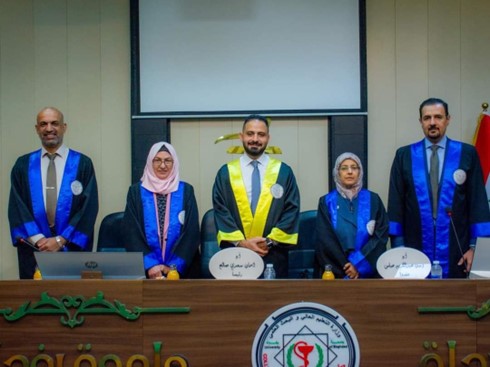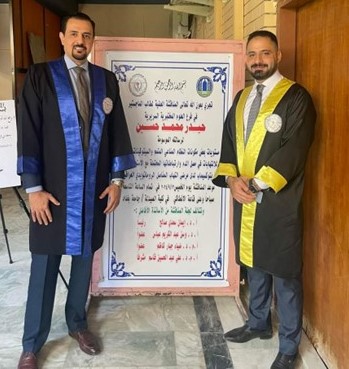The College of Pharmacy discussed the Msc thesis entitled “Serum Levels of Some Complement Regulators and Pro-inflammatory Cytokines and Their Potential Correlations with Response to Rituximab Treatment in Iraqi Rheumatoid Arthritis Patients” by Haidar Mohammed Hussein and his supervisor, Assist. Prof. Dr. Ali Abdulhussain Kasim, in the Clinical Laboratory Sciences Department. The study aimed to investigate the serum levels of the complement regulators, including Factor I, decay-accelerating factor (DAF), and CD59, as well as of the pro-inflammatory cytokines, including tumor necrosis factor-alpha (TNF-α), interleukin (IL)-1β, IL-6, and Interferon-gamma (IFN-γ), and assess their potential association with response to Rituximab (RTX) therapy in rheumatoid arthritis patients. A cross-sectional study was conducted in the Specialized Center of Rheumatology at Baghdad Teaching Hospital in Baghdad/Iraq during the period from January to November 2023. Ninety adult patients who were already diagnosed with rheumatoid arthritis and receiving RTX intravenous infusion for at least six months (1 cycle) were enrolled in the study. The selected patients were either responders to RTX (45 patients) or non-responders to RTX (45 patients). The response to RTX was assessed according to the 28-joint disease activity score. The results showed that the serum levels of the complement regulators (Factor I, DAF, and CD59) were significantly elevated in non-responders in comparison to responders. Similarly, the serum levels of pro-inflammatory mediators (TNF-α, IL-1β, IL-6, and IFN-γ) were significantly elevated in non-responders in comparison to responders. The study showed that the serum levels of Factor I, DAF, CD59, TNF-α, IL-1β, IL-6, and IFN-γ have good potential to be used in the assessment of the response to RTX therapy among patients with rheumatoid arthritis.




